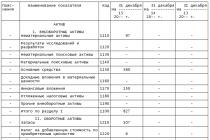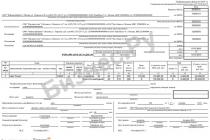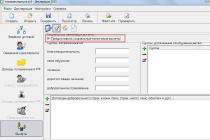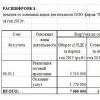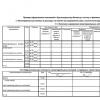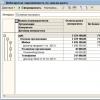Art. 226 of the Tax Code of the Russian Federation (as amended) fixes the features of the calculation of personal income tax by agents, the periods and procedure for transferring mandatory payments by them. The Code establishes that the tax is paid to the budget according to special rules. Usually, personal income tax is calculated, withheld and transferred by agents - persons from whom payers receive their income. Let's take a closer look Art. 226 of the Tax Code of the Russian Federation as amended in 2016.
General order
It is established by paragraph 1 of Art. 226 of the Tax Code of the Russian Federation. As stipulated by the regulations, the obligation to determine (calculate), withhold and transfer the amount of personal income tax to the budget fund is imputed to entities from which or within the framework of relations with which the citizen (payer) received the income specified in the second paragraph of the norm under consideration. These persons are considered tax agents. To them, the first paragraph of Art. 226 of the Tax Code of the Russian Federation includes:
- domestic organizations.
- Privately practicing notaries and lawyers.
- individual entrepreneurs.
- Separate structural units of foreign companies in Russia.
The amount to be withheld from income is calculated in accordance with the rules of Article 224 of the Code, subject to special provisions provided for by the norm in question. As stated in Art. 226 of the Tax Code of the Russian Federation, the amount of tax on the profits of lawyers is calculated, withheld and transferred by collegiums, legal advice offices, bureaus.
Specificity of calculus
In the second paragraph of Art. 226 of the Tax Code of the Russian Federation, it is fixed that the calculation of personal income tax and its payment are made on all incomes of the payer, if their source is an agent. The exception is receipts, in respect of which the determination of amounts and their transfer to the budget is carried out according to the rules of Articles 228, 226.1, 227, 214.3-214.6 of the Code. In other cases, it is allowed to offset deductions withheld earlier, and in cases and according to the rules of Art. 227.1 - taking into account the reduction by the amount of advances (fixed) paid by the taxpayer. 
Special rules
The calculation of the amounts of personal income tax is made by agents on the day of actual receipt of income. This date is determined according to the rules of Article 223 of the Code. The calculation is made on an accrual basis from the beginning of the period. This rule applies to all income for which a rate is set in accordance with Norm 224. An exception is income from equity participation in the capital of other companies. In this case, the amounts of personal income tax withheld in previous months are counted. The tax in relation to receipts for which other rates are set, as well as from equity participation, are calculated by agents for each income separately. The corresponding rule provides for the third paragraph of Art. 226 of the Tax Code of the Russian Federation. The necessary calculation must be made without taking into account the payer's receipts received from other agents and the amounts withheld by them.
Features of income
As provided for in paragraph 4 of Art. 226 of the Tax Code of the Russian Federation, agents are required to withhold the calculated amount of personal income tax directly from the payer's receipts at the time of their actual receipt. This takes into account a number of features. If income is provided in kind or presented as a tangible benefit, a withholding is made from any remuneration that is presented in cash. Moreover, it cannot be more than 50% of the amount of money paid. Rules of paragraph 4 of Art. 226 of the Tax Code of the Russian Federation are not subject to application to agents acting as credit institutions, when withholding and deducting tax on income received by clients (except for those who are employees) in the form of material benefits established in accordance with Article 212 of the Code. 
Special cases
If it is impossible to withhold from the payer during the period of calculated tax, the agent, according to the provisions paragraph 5 of Art. 226 Tax Code of the Russian Federation, must not later than 1.03 of the year following the one in which the circumstances arose, send a written notification to the control body. The notice indicates the amount from which personal income tax was not deducted, and its value. The form of notification of the impossibility of withholding, the amount of revenue and tax not transferred to the budget, the rules for submitting a message are established by the federal executive institution authorized for fiscal control and supervision. In paragraph 5 of Art. 226 of the Tax Code of the Russian Federation specifically stipulates the actions of agents - Russian enterprises that have separate divisions, classified as the largest payers, individual entrepreneurs, registered at the address of their business and using UTII or the patent system. In case of impossibility to make proper retention, they are also obliged to report this to the control body. The notification shall be sent in the manner prescribed by Article 230 (paragraph two) of the Code.
Timing
They are defined by paragraph 6 of Art. 226 of the Tax Code of the Russian Federation. As enshrined in its provisions, agents must transfer personal income tax before the date following the day the payer receives the corresponding income. If a person was paid disability benefits, child care, vacation pay, calculated tax, as prescribed by paragraph 6 of Art. 226 of the Tax Code of the Russian Federation, are sent to the budget no later than the last day of the period in which these receipts were.
Place of tax payment
The total amount of personal income tax, determined and withdrawn by the agent from the payer, in relation to which it is considered a source of income, is sent to the budget at the address of registration (residence) of the agent, unless other rules are provided for in paragraph 7 of Art. 226 of the Tax Code of the Russian Federation. Domestic enterprises indicated in the first paragraph, having subdivisions (separate) are obliged to transfer both at the place of their location and the location of each structural unit. In the latter case, the amount of personal income tax is determined in accordance with the amount of income subject to taxation, accrued and issued to employees, as well as arising from the terms of civil law contracts concluded with individuals on behalf of the enterprise. Agents with the status of entrepreneurs, registered at the address of their business and using the UTII / patent system, are required to transfer from the income of employees the amounts of tax calculated and withheld from them at the place of registration as an individual entrepreneur. 
Additionally
Russian organizations that transfer monetary allowance, maintenance, earnings, and other remuneration to military personnel, persons from among the civilian personnel of the Armed Forces act as agents within the framework of the application of the rule under consideration. The total amount of personal income tax calculated and withheld from these amounts is sent to the budget at the address of the source income. If the amount of tax payable is more than one hundred rubles, it is transferred in the manner prescribed by Article 226. If the value is less than the specified value, it is added to the amount of personal income tax of the next month, but not later than the last month in the current period. Legislation prohibits the deduction of tax from the agent's funds. When drawing up contracts, it is not allowed to include clauses in them that imply that the source of income assumes the obligation to bear the costs of transferring payments to the budget.
Art. 226 of the Tax Code of the Russian Federation: comments
The obligation to calculate, withhold and send personal income tax to the budget is established for a certain category of persons. The following are recognized as agents:
- domestic enterprises.
- Bar associations or bureaus, legal consultations.
- Permanent representative offices of foreign legal entities.
- Individual entrepreneurs.
- Privately practicing notaries, lawyers with offices.
These entities must fulfill the obligation established by the Tax Code every time they pay income to individuals.
Difficulties in practice
Some problems arise in determining the person who acts as an agent in the payment of royalties through an organization that manages the rights of authors on a collective basis. Today, there are several legal entities in Russia that are accredited to conduct this activity. These organizations accept funds from copyright holders. The latter act as rewards. The Ministry of Finance, in one of its Letters, explained that a legal entity using products of intellectual labor, in relation to fees transferred to copyright holders and authors of literary works, act in the status of agents. Accordingly, it must fulfill all the obligations provided for by Chapter 23 of the Code. 
Exceptions
Meanwhile, the above rule does not apply to all subjects. Paragraph 2 of Article 226 stipulates that in a number of cases the source of income does not perform the duties of an agent. Independently deduct personal income tax must:
- Persons in the status of individual entrepreneurs - from the proceeds from their activities.
- Privately practicing notaries and other similar citizens - according to income derived in the course of work.
They also independently perform the duties of calculating, withholding and directing tax to the budget of individuals who have received income:
- Under civil law type agreements that were drawn up with another individual who does not act in the status of an agent. These include, for example, transactions on the hiring / renting of property.
- From sources located in other countries.
- From the sale of material assets owned by individuals.
- In the form of winnings paid out by the organizers of sweepstakes, lotteries and other risk-based games.
Individuals also pay personal income tax on their own, from whose remuneration the agent failed to deduct and deduct. This, in particular, is typical for receipts received in non-monetary form. All payers listed above must, at the end of the period, submit a declaration to the control authority at the address of residence.

Scheme of calculation, deduction and transfer
Personal income tax at a rate of 13% is calculated on an accrual basis from the beginning of the period on a monthly basis. The rule applies to all income taxed at this rate. The legislation also provides for other rates: 9, 30, 15, 35%. These tariffs are calculated separately for each amount of receipts accrued to the payer. When making calculations, incomes received from other agents are not taken into account. Accordingly, taxes calculated and withheld from these receipts are not taken into account. Only money actually paid out can participate in the calculation. They can be transferred to the account of the payer or to the account of third parties (if there is a corresponding order). At the same time, the legislation establishes a limit on the amount of personal income tax. The amount of tax cannot be more than half of the income paid to an individual.
Control Service Notification
It is mandatory if the agent, for one reason or another, could not withhold and transfer the calculated amount of personal income tax to the budget. A notice to the supervisory authority is sent, as prescribed by paragraph 5 of Art. 226 of the Tax Code of the Russian Federation, no later than a month from the date of completion of the period in which these hindering circumstances appeared. The notice must be in writing. It is sent to the agent's accounting address. The document must indicate the fact that it is impossible to withhold and transfer the mandatory payment, the amount of income and tax.
Nuances
In some cases, excessively transferred amounts of personal income tax may be found. The law allows for their return. The agent pays the amounts at the request of the payer. If the tax has not been withheld (in part or in full), it is subject to collection from the individual until the entire debt is paid off. In paragraph 6 of Art. 226 of the Tax Code of the Russian Federation establishes the terms in which the agent is obliged to transfer personal income tax. 
Conclusion
The Tax Code clearly establishes the duties, rights and responsibilities of entities obliged to calculate, withhold and transfer taxes to the budget. The regulation strictly regulates the deadlines for the implementation of orders. As a rule, enterprises have a special department responsible for tax accounting. Individual entrepreneurs usually independently carry out settlements, deductions and transfers. The main problems in practice are related to situations where the agent, for some reason, could not fulfill the obligation established by the Code. In order to avoid being held liable, he must promptly notify the supervisory authority of the situation. At the same time, an individual whose income was not calculated, withheld and sent to the budget tax, is obliged to independently perform the necessary operations. Otherwise, he may be held liable for violation of tax regulations. It is worth saying that individuals, from whose receipts the agent failed to transfer personal income tax, are usually not sent notifications of debt. In this regard, citizens have to independently control the situation. Problems can also arise when the subject receives income in non-monetary form. As indicated by the Tax Code, as well as the Letter of the Ministry of Finance, the calculation and deduction in such situations are made from other receipts of the person, expressed in money. However, the agent must be aware of the limitation on the amount deducted to the budget.



